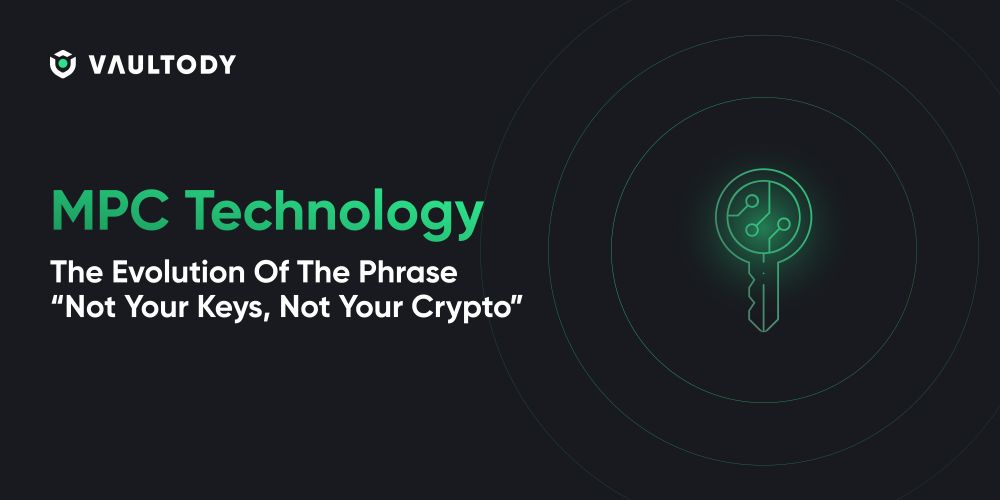The very popular crypto mantra “not your keys, not your crypto” also commonly found in the virtual space as “not your keys, not your coins”, became exceptionally popular with the fall of the second largest centralized exchange in 2022, FTX.
This expression constitutes an investors` belief of uncertainty, in a sense that they cannot get hold of their own digital possessions, unless their crypto is kept in a wallet for which they personally own and hold the keys.
It's widely known that wallets have been often targeted and compromised by hackers in the past, and this unfortunate trend continues. Even the wallets of leading centralized exchanges (CEXs), which manage millions and billions of dollars, have not been immune to such attacks, resulting in substantial losses for both the platforms and their users over the years.
This era has drawn to a close with the introduction of multi-party computing (MPC) technology, which Vaultody utilizes to deliver the highest levels of security, privacy, and peace of mind available in the market today. MPC technology is particularly beneficial for our business clients, many of whom engage in high-volume and high-value transactions. In these situations, protecting funds must be without any compromises, and MPC technology ensures exactly that.
Your Keys, Your Crypto - You Are In Full Control
The MPC technology solves the two major ways of how the entire crypto sector was operating with funds over the years. The solution comes with an advanced cryptography and very flexible controlling mechanisms that MPC wallet account holders can set, involving multiple parties approving and rejecting transactions.
So far, the crypto sector has been dealing with funds in the following two ways:
- Custodial services via CEX platforms - users sacrifice their control and freedom on funds for an exchange of mediocre level of security and comfort, knowing that someone else is responsible for storing their assets
- Non-custodial wallets - Users are in control of their private keys (xPriv) and all funds-related operations such as transacting, storing etc. However, these wallets are more vulnerable to hacks due to their single private key. It is also easier to lose your keys.
MPC Wallet Specifications
The most important feature of the multi-party computing (MPC) wallet is that unlike traditional single wallets, there is no single point of failure. Instead of having a single key for signing and authorizing transactions, in MPC the private key is split into different encrypted fractions, known as key shards.
Each of the signees that have been granted access to an MPC wallet owns their encrypted fractions of the private key. For security reasons, all key shards are stored across different secure and protected servers. In Vaultody, by default these servers are owned and managed by us, however, clients may choose to share responsibilities for storage of the key fractions with us, and keep shards across both Vaultody`s and their own cloud servers. It is also possible all shards to be stored 100% on clients own servers or servers that the client is using - this is available upon request and can be customized to cater for client's wishes and requirements.
The unparalleled security оf MPC wallet that we touched upon earlier is not limited to key shards only. Apart from eliminating the single point of failure (losing the private key, getting hacked and etc), the MPC technology prevents individual wallet entries - all signees` key fractions must be combined together in order transactions to be broadcast. This serves as a barrier, stopping not only external attempts for obtaining access to the wallet, but also prevents internal threats.
The vault owner remains in full control of their funds аt all times. In Vaultody, account owners can do much more than that, such as introducing transaction policies, two-level approval mechanism with daily limits on transactions (i.e. low-value transactions could go through without any approval or with the approval of members assigned to Level 1; High-value transactions will require Level 1 + Level 2 members approval/rejection). The control over funds and your funds management cannot be compared to what single or multi-sig wallets provide when.
Backing-up your wallet and recovering it successfully can be a difficult, optional, or even impossible action in most wallets, which puts at risk your funds. Vaultody is solving this with our compulsory back-up, which we require the account owner to create during the set-up of their vault.
To support the generation of your vault`s backup, we've designed our open-source recovery tool. It facilitates four key actions: creating a backup, generating a robust password to protect the backup, optionally creating a unique RSA key pair, and facilitating a seamless recovery process. During recovery, the account owner just needs to input the required information and follow the provided instructions for a successful recovery procedure.
For detailed information on the MPC technology and Vaultody`s MPC solutions, do not hesitate to get in touch with our team with your inquiries.









 Copy link
Copy link